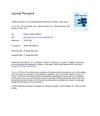 4 citations,
October 2022 in “Microbial Cell Factories”
4 citations,
October 2022 in “Microbial Cell Factories” Certain bacteria from the Citrullus colocynthis plant may be a new source of antibiotics to fight drug-resistant diseases.
1 citations,
December 2023 in “Life” PRP helps skin heal, possibly through special cells called telocytes.
 1 citations,
May 2006 in “Thyroid Research and Practice”
1 citations,
May 2006 in “Thyroid Research and Practice” Skin can become dry and thick in hypothyroidism.
August 2024 in “Journal of Photochemistry and Photobiology B Biology” Combining light therapy with certain substances improves hair growth in people with hair loss.
 July 2024 in “Clinical Cosmetic and Investigational Dermatology”
July 2024 in “Clinical Cosmetic and Investigational Dermatology” Non-drug therapies show promise for hair regrowth but need more research.
17 citations,
April 2021 in “Frontiers in Pharmacology” Activating Nrf2 can help protect against hearing loss.
 8 citations,
October 2021 in “Microbiology spectrum”
8 citations,
October 2021 in “Microbiology spectrum” Researchers identified five new potential targets for leishmaniasis treatment, suggesting repurposing existing drugs could be effective.
 2 citations,
January 2022 in “Genetics Research”
2 citations,
January 2022 in “Genetics Research” Using hemocoagulase with platelet-rich plasma in hip replacement can lessen blood loss and improve healing and blood clotting.
 January 2024 in “Biotechnology advances”
January 2024 in “Biotechnology advances” Bioassays help find useful compounds in nature for making medicines, supplements, and cosmetics.
 December 2022 in “Türk biyokimya dergisi”
December 2022 in “Türk biyokimya dergisi” The conclusions are: fecal short-chain fatty acids may help prevent cancer, fiber intake can reduce obesity, weight loss is hard for obese people, low BMI cancer patients are more prone to chemotherapy side effects, intermittent fasting benefits gut health, cherry laurel has health benefits in rats, certain gene variations can increase stress in hair loss patients, fecal acids can affect blood sugar levels, cold agglutinin can affect blood test results in autoimmune patients, and people with Crohn's disease have higher levels of a certain chemical in their blood.
 54 citations,
January 2023 in “Signal Transduction and Targeted Therapy”
54 citations,
January 2023 in “Signal Transduction and Targeted Therapy” New therapies are being developed that target integrin pathways to treat various diseases.
 18 citations,
December 2021 in “Foods”
18 citations,
December 2021 in “Foods” Seaweeds contain beneficial compounds with potential uses in food, cosmetics, and health, but more research is needed to improve extraction and safety.
8 citations,
May 2024 in “Diagnostics” AI chatbots can help teach dermatology but need careful checking for accuracy.
 3 citations,
May 2021 in “Evidence-based Complementary and Alternative Medicine”
3 citations,
May 2021 in “Evidence-based Complementary and Alternative Medicine” Some traditional Chinese medicines may have anti-aging benefits and could help with hair growth, but more research is needed.
2 citations,
October 2023 in “Biology” Cobalt is important for health but too much or too little can cause health problems, and its environmental buildup is a concern.
1 citations,
May 2024 in “Applied Sciences” Cordyceps militaris is a promising, cost-effective medicinal fungus with health benefits and efficient production methods.
1 citations,
December 2023 in “Molecules/Molecules online/Molecules annual” JAK inhibitors show promise for treating various skin diseases.
 1 citations,
September 2022 in “BioNanoScience”
1 citations,
September 2022 in “BioNanoScience” Tofacitinib can help hair grow back in alopecia patients but hair loss might return if the dose is lowered.
 1 citations,
May 2021 in “BMC Proceedings”
1 citations,
May 2021 in “BMC Proceedings” The document concludes that more research is needed to reduce frequent hospital visits, addiction medicine education improves with specific training, early breast cancer surgery findings are emerging, nipple smears are not very accurate, surgery for older melanoma patients doesn't extend life, a genetic condition in infants can often be treated with one drug, doctors are inconsistent with blood clot medication, a certain gene may protect against cell damage, muscle gene overexpression affects many other genes, and some mitochondrial genes are less active in mice with tumors.
 January 2025 in “Frontiers in Pediatrics”
January 2025 in “Frontiers in Pediatrics” Baricitinib significantly improved hair regrowth and skin condition in a 14-year-old with alopecia areata and atopic dermatitis.
November 2024 in “Psychoneuroendocrinology” Testosterone increases hair testosterone levels, stress raises hair cortisol, and relationship status affects hormone levels.
 4 citations,
January 2023 in “The journal of allergy and clinical immunology/Journal of allergy and clinical immunology/The journal of allergy and clinical immunology”
4 citations,
January 2023 in “The journal of allergy and clinical immunology/Journal of allergy and clinical immunology/The journal of allergy and clinical immunology” Biologics, especially Dupilumab, are effective and safe for treating severe childhood eczema.
April 2024 in “Journal of clinical medicine” Recognizing specific skin features helps diagnose and manage lupus erythematosus effectively.
 4 citations,
November 2021 in “Journal of the European Academy of Dermatology and Venereology”
4 citations,
November 2021 in “Journal of the European Academy of Dermatology and Venereology” There might be a skin condition related to COVID-19.
 1 citations,
April 2021 in “Clinical and Experimental Dermatology”
1 citations,
April 2021 in “Clinical and Experimental Dermatology” The COVID-19 pandemic has caused a 57% increase in interest in facial cosmetic procedures, leading to calls for better industry regulation and professional standards.
 January 2021 in “Clinical case studies and reports”
January 2021 in “Clinical case studies and reports” A man had nail and hair changes months after severe Covid-19, showing long-term effects.
 1 citations,
January 2024
1 citations,
January 2024 Long COVID affects many body systems and needs careful management.

Self-monitoring blood pressure in pregnant women didn't improve outcomes, diabetes drugs may increase gallbladder disease risk, a new drug helps severe hair loss, a plant-based COVID-19 vaccine is 69.5% effective, and new anticoagulants are safer for diabetics with heart rhythm issues than warfarin.
 4 citations,
October 2020 in “JAAD Case Reports”
4 citations,
October 2020 in “JAAD Case Reports” Platelet-rich plasma may improve vitiligo treatment when used with phototherapy.
 2 citations,
September 2021 in “JAAD case reports”
2 citations,
September 2021 in “JAAD case reports” Dupilumab helped a woman with severe hair loss regrow her hair quickly and maintain it for six months after stopping treatment.




















